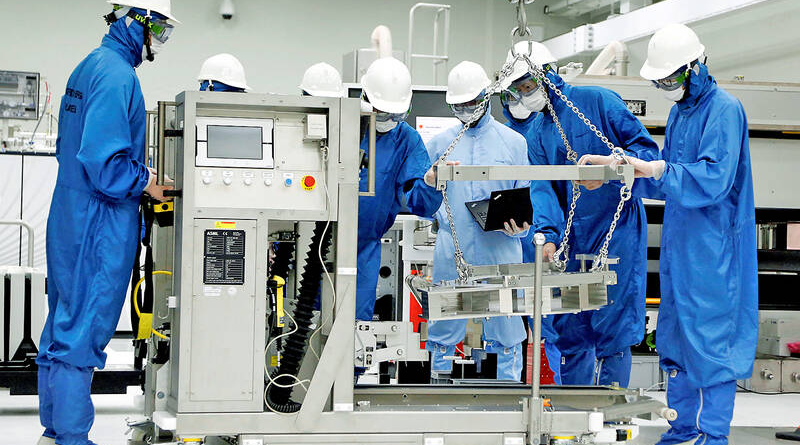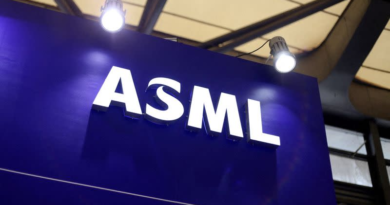Tokyo Electron lifts outlook after deliveries moved up – 台北時報
Tokyo Electron Ltd yesterday raised its profit outlook for the year after Chinese chipmakers moved up deliveries ahead of a possible crackdown on exports of Japanese production equipment.
The Tokyo-based supplier to Taiwan Semiconductor Manufacturing Co (台積電) and Intel Corp lifted its forecast for the year to next month above expectations to ¥580 billion (US$4.4 billion).
Some companies in China are accelerating deliveries and investment plans, fearful of not being able to secure equipment as international trade walls rise, Tokyo Electron executives said on an earnings call.
Photo: Reuters
The company, which competes against Applied Materials Inc, had slashed forecasts in November last year in the wake of US sanctions on advanced chip-related exports.
There was a dip in the fourth quarter last year as US chip gear makers were unable to ship to Chinese customers and production was challenged, but the feared cratering in demand did not materialize, Tokyo Electron general manager of finance Hiroshi Kawamoto said.
“The equipment industry has entered a new stage for further growth,” Kawamoto said. “We expect a recovery from the second half of 2023 and continued growth from 2024, thanks to rising demand from areas like virtual reality, as well as government support for investments.”
The company is closely watched for its reaction to the news that Japan and the Netherlands have agreed to join the US in imposing export controls on advanced semiconductor technology and products to China.
Tokyo Electron is one of a handful of suppliers to the global chipmaking industry, providing machinery to fabricate the latest generation of chips.
Tokyo Electron, which also announced a three for one stock split, reported ¥114.8 billion operating profit for last quarter, above average analyst estimates of ¥102 billion.
Demand for semiconductor production equipment was stronger than expected thanks to orders from foundry makers, the company said.
It now expects net sales of semiconductor production equipment of ¥2.12 trillion for the full year, up from a previous forecast of ¥2.05 trillion.
“China will remain an important market for Tokyo Electron,” Kawamoto said, adding that the company has no plans to shrink operations in a country it sees as a large market for automotive power chips. “We do not just deal in cutting-edge equipment.”
Tokyo Electron and fellow Japanese semiconductor industry players Renesas Electronics Corp, Nikon Corp and Sumco Corp each have a significant proportion of their sales going directly to China, with even more of their business dependent on the market via sales by their customers.
Dutch equipment maker ASML Holding NV said at the end of last month that the sanctions would not have a material impact on its earnings this year, despite China perennially being one of the biggest importers of chips and chip technology.
Silicon wafer maker Sumco, which also reported earnings yesterday, said that demand from automotive and industrial-use customers remains strong, but the weak smartphone market is likely to yield lower wafer orders this year before recovering next year.
The inventory adjustments that have hit the memorychip-making industry hard in the past few months are likely to continue for the time being, Sumco chief executive officer Mayuki Hashimoto said.
Packed into a small room, a drone, bipedal robot, supermarket checkout and other devices showcase a vision of China’s software future — one where an operating system developed by national champion Huawei (華為) has replaced Windows and Android. The collection is at the Harmony Ecosystem Innovation Center in the southern city of Shenzhen, a local government-owned entity that encourages authorities, companies and hardware makers to develop software using OpenHarmony (鴻蒙), an open-source version of the operating system Huawei launched five years ago after US sanctions cut off support for Google’s Android. While Huawei’s recent strong-selling smartphone launches have been closely watched for
The waves of the Aegean Sea lap gently at the tables and chairs of two beach restaurants on Greece’s Halkidiki peninsula. It is an idyllic scene, but one that is totally illegal. Like many others in Greece, the two establishments on Pefkochori Beach do not have a license to set up shop so close to the water. After a wave of protests last summer by locals about bars and restaurants illegally covering beaches with sunbeds and tables, the Greek state is taking action. It is cracking down on rogue tourist practices with surveillance drones, satellite imagery and a special app
South Korea’s SK Hynix Inc, the world’s No. 2 memorychip maker, is to invest 103 trillion won (US$74.6 billion) through 2028 to strengthen its chips business, focusing on artificial intelligence (AI), its parent SK Group said yesterday. SK Group also said it plans to secure 80 trillion won by 2026 to invest in AI and semiconductors as well as fund shareholder returns, while streamlining its more than 175 subsidiaries. The sprawling conglomerate outlined the plans following a two-day strategy meeting, aiming to revive the group after SK Hynix, its main money maker, and the group’s electric vehicle battery arm suffered heavy losses. SK
Luxgen Motor Co (納智捷汽車), a subsidiary of Yulon Motor Co (裕隆汽車), yesterday said it is again offering a NT$100,000 discount for its entry-level n7 electric vehicle models. The n7’s price has gone down from NT$1.099 million to NT$999,000, Luxgen said, adding that there are 25,000 preorders for the model. MG Motor’s electric hatchback, the MG4, entered the market in the middle of last month, with a starting price of NT$990,000. China Motor Corp (中華汽車), which distributes MG vehicles in Taiwan, said it aims to sell 1,600 MG4s this year. MG, originally a British brand, was acquired by China’s SAIC Motor

